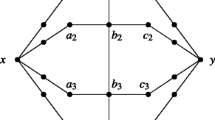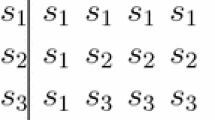Abstract
Motivated by the rapidly developing theory of lattice-valued (or, more generally, variety-based) topological systems, which takes its origin in the crisp concept of S. Vickers (introduced as a common framework for both topological spaces and their underlying algebraic structures—frames or locales), the paper initiates a deeper study of one of its incorporated mathematical machineries, i.e., the realm of soft sets of D. Molodtsov. More precisely, we start the theory of lattice-valued soft universal algebra, which is based in soft sets and lattice-valued algebras of A. Di Nola and G. Gerla. In particular, we provide a procedure for obtaining soft versions of algebraic structures and their homomorphisms, as well as basic tools for their investigation. The proposed machinery underlies many concepts of (lattice-valued) soft algebra, which are currently available in the literature, thereby enabling the respective researchers to avoid its reinvention in future.
Similar content being viewed by others
References
Acar U, Koyuncu F, Tanay B (2010) Soft sets and soft rings. Comput Math Appl 59(11):3458–3463
Adámek J, Herrlich H, Strecker GE (2009) Abstract and concrete categories: the joy of cats. Dover Publications, Mineola
Aerts D (1999) Foundations of quantum physics: a general realistic and operational approach. Int J Theor Phys 38(1):289–358
Aerts D, Colebunders E, van der Voorde A, van Steirteghem B (1999) State property systems and closure spaces: a study of categorical equivalence. Int J Theor Phys 38(1):359–385
Aerts D, Colebunders E, van der Voorde A, van Steirteghem B (2002) On the amnestic modification of the category of state property systems. Appl Categ Struct 10(5):469–480
Aktaş H, Çağman N (2007) Soft sets and soft groups. Inf Sci 177(13):2726–2735
Anthony JM, Sherwood H (1979) Fuzzy groups redefined. J Math Anal Appl 69:124–130
Aygünoğlu A, Aygün H (2009) Introduction to fuzzy soft groups. Comput Math Appl 58(6):1279–1286
Çağman N, Karataş S, Enginoglu S (2011) Soft topology. Comput Math Appl 62:351–358
Cohn PM (1981) Universal algebra. D. Reidel Publishing Company, Dordrecht
Dempster AP (1967) Upper and lower probabilities induced by a multivalued mapping. Ann Math Stat 38:325–339
Denniston JT, Rodabaugh SE (2009) Functorial relationships between lattice-valued topology and topological systems. Quaest Math 32(2):139–186
Denniston JT, Melton A, Rodabaugh SE (2009) Lattice-valued topological systems. In: Bodenhofer U, De Baets B, Klement EP, Saminger-Platz S (eds) Abstracts of the 30th Linz seminar on fuzzy set theory. Johannes Kepler Universität, Linz, pp 24–31
Denniston JT, Melton A, Rodabaugh SE (2010) Lattice-valued predicate transformers and interchange systems. In: Cintula P, Klement EP, Stout LN (eds) Abstracts of the 31st Linz seminar on fuzzy set theory. Johannes Kepler Universität, Linz, pp 31–40
Denniston JT, Melton A, Rodabaugh SE (2011) Formal concept analysis and lattice-valued interchange systems. In: Dubois D, Grabisch M, Mesiar R, Klement EP (eds) Abstracts of the 32nd Linz seminar on fuzzy set theory. Johannes Kepler Universität, Linz, pp 41–47
Denniston JT, Melton A, Rodabaugh SE (2012) Interweaving algebra and topology: lattice-valued topological systems. Fuzzy Sets Syst 192:58–103
Denniston JT, Melton A, Rodabaugh SE (2013) Formal concept analysis and lattice-valued Chu systems. Fuzzy Sets Syst 216:52–90
Di Nola A, Gerla G (1987) Lattice valued algebras. Stochastica 11(2–3):137–150
Dijkstra EW (1976) A discipline of programming. Prentice-Hall, Englewood Cliffs
Dubois D, Prade H (1989) Fuzzy sets, probability and measurement. Eur J Oper Res 40(2):135–154
Dubois D, Prade H (1991) Random sets and fuzzy interval analysis. Fuzzy Sets Syst 42(1):87–101
Dubois D, Prade H (2008a) A set-theoretic view of belief functions. Logical operations and approximations by fuzzy sets. In: Yager RR, Liu L (eds) Classic works on the Dempster–Shafer theory of belief functions. Studies in Fuzziness and Soft Computing, vol 219. Springer, Berlin, pp 375–410
Dubois D, Prade H (2008b) Gradual elements in a fuzzy set. Soft Comput 12(2):165–175
Erné M, Koslowski J, Melton A, Strecker GE (1993) A primer on Galois connections. Ann N Y Acad Sci 704:103–125
Feng F, Jun YB, Zhao X (2008) Soft semirings. Comput Math Appl 56(10):2621–2628
Frascella A, Guido C, Solovyov S (2011) Dual attachment pairs in categorically-algebraic topology. Appl Gen Topol 12(2):101–134
Frascella A, Guido C, Solovyov S (2013) Algebraically-topological systems and attachment. Iran J Fuzzy Syst (to appear)
Ganter B, Wille R (1996) Formale Begriffsanalyse. Mathematische Grundlagen. Springer, Berlin
Gierz G, Hofmann KH et al (2003) Continuous lattices and domains. Cambridge University Press, Cambridge
Goguen JA (1967) L-fuzzy sets. J Math Anal Appl 18:145–174
Goodman IR (1982) Fuzzy sets as equivalence classes of random sets. In: Yager RR (ed) Fuzzy set and possibility theory. Recent developments. Papers presented at the symposium held in Acapulco (Mexico), December 1980. Pergamon Press, Elmsford, pp 327–343
Grätzer G (2008) Universal algebra, 2nd edn. Springer, Berlin
Guido C (2009) Attachment between fuzzy points and fuzzy sets. In: Bodenhofer U, De Baets B, Klement EP, Saminger-Platz S (eds) Abstracts of the 30th Linz seminar on fuzzy set theory. Johannes Kepler Universität, Linz, pp 52–54
Guido C (2010) Fuzzy points and attachment. Fuzzy Sets Syst 161(16):2150–2165
Gutiérrez García J, Rodabaugh SE (2005) Order-theoretic, topological, categorical redundancies of interval-valued sets, grey sets, vague sets, interval-valued “intuitionistic” sets, “intuitionistic” fuzzy sets and topologies. Fuzzy Sets Syst 156(3):445–484
Herrlich H, Strecker GE (2007) Category theory, 3rd edn. Sigma Series in Pure Mathematics, vol 1, Heldermann Verlag, Germany
Hungerford T (2003) Algebra. Springer, Berlin
Inan E, Ozturk MA (2012) Fuzzy soft rings and fuzzy soft ideals. Neural Comput Appl 21(1):1–8
Jaballah A, Saidi FB (2006) Uniqueness results in the representation of families of sets by fuzzy sets. Fuzzy Sets Syst 157(7):964–975
Johnstone PT (1982) Stone spaces. Cambridge University Press, Cambridge
Jun YB (2008) Soft BCK/BCI-algebras. Comput Math Appl 56(5):1408–1413
Jun YB, Park CH (2008) Applications of soft sets in ideal theory of BCK/BCI-algebras. Inf Sci 178(11):2466–2475
Jun YB, Park CH (2009) Applications of soft sets in Hilbert algebras. Iran J Fuzzy Syst 6(2):75–88
Jun YB, Lee KJ, Park CH (2009a) Soft set theory applied to ideals in d-algebras. Comput Math Appl 57(3):367–378
Jun YB, Lee KJ, Zhan J (2009b) Soft p-ideals of soft BCI-algebras. Comput Math Appl 58(10):2060–2068
Kendall DG (1974) Foundations of a theory of random sets. In: Harding EF, Kendall DG (eds) Stochastic geometry. Wiley, New York, pp 322–376
Kruml D, Paseka J (2008) Algebraic and categorical aspects of quantales. In: Hazewinkel M (ed) Handbook of algebra, vol 5. Elsevier, Amsterdam, pp 323–362
Liu X, Xiang D, Zhan J (2012) Fuzzy isomorphism theorems of soft rings. Neural Comput Appl 21(2):391–397
Mac Lane S (1998) Categories for the working mathematician, 2nd edn. Springer, Berlin
Maji PK, Biswas R, Roy AR (2001) Fuzzy soft sets. J Fuzzy Math 9(3):589–602
Maji PK, Biswas R, Roy AR (2003) Soft set theory. Comput Math Appl 45(4–5):555–562
Manes EG (1976) Algebraic theories. Springer, Berlin
Matheron G (1975) Random sets and integral geometry. Wiley, New York
Molodtsov D (1999) Soft set theory—first results. Comput Math Appl 37(4–5):19–31
Mordeson JN, Malik DS (1998) Fuzzy commutative algebra. World Scientific, Singapore
Negoita CV, Ralescu DA (1975a) Applications of fuzzy sets to systems analysis. Interdisciplinary Systems Research, vol 11. Birkhäuser Verlag
Negoita CV, Ralescu DA (1975b) Representation theorems for fuzzy concepts. Kybernetes 4:169–174
Nguyen HT (1984) On modeling of linguistic information using random sets. Inf Sci 34:265–274
Pazar Varol B, Shostak A, Aygün H (2011) Categories related to topology viewed as soft sets. In: Proceedings of the 7th conference of the European society for fuzzy logic and technology (EUSFLAT-2011) and LFA-2011, vol 1. Advances in Intelligent Systems Research, no. 1, Atlantis Press, pp 883–890
Pratt V (1999) Chu spaces. School on category theory and applications. Lecture notes of courses, Coimbra, Portugal. Universidade de Coimbra, Departamento de Matemática. Textos Mat., Sér. B., Coimbra, vol 21, pp 39–100
Ralescu DA (1992) A generalization of the representation theorem. Fuzzy Sets Syst 51(3):309–311
Richter G (1979) Kategorielle algebra. Akademie-Verlag, Berlin
Rodabaugh SE (1997) Powerset operator based foundation for point-set lattice-theoretic (poslat) fuzzy set theories and topologies. Quaest Math 20(3):463–530
Rodabaugh SE (1999a) Categorical foundations of variable-basis fuzzy topology. Mathematics of fuzzy sets: logic, topology and measure theory. In: Höhle U, Rodabaugh SE (eds) The handbooks of fuzzy sets series, vol 3. Kluwer Academic Publishers, Dordrecht, pp 273–388
Rodabaugh SE (1999b) Powerset operator foundations for poslat fuzzy set theories and topologies. Mathematics of fuzzy sets: logic, topology and measure theory. In: Höhle U, Rodabaugh SE (eds) The handbooks of fuzzy sets series, vol 3. Kluwer Academic Publishers, Dordrecht, pp 91–116
Rodabaugh SE (2007) Relationship of algebraic theories to powerset theories and fuzzy topological theories for lattice-valued mathematics. Int J Math Math Sci 2007:1–71
Rosenfeld A (1971) Fuzzy groups. J Math Anal Appl 35:512–517
Rosenthal KI (1990) Quantales and their applications. Pitman Research Notes in Mathematics, vol 234. Addison Wesley Longman
Saidi FB, Jaballah A (2007) From fuzzy sets to the decompositions of non-rigid sets. Fuzzy Sets Syst 158(16):1751–1766
Sánchez D, Delgado M, Vila MA, Chamorro-Martínez J (2012) On a non-nested level-based representation of fuzziness. Fuzzy Sets Syst 192:159–175
Shabir M, Naz M (2011) On soft topological spaces. Comput Math Appl 61(7):1786–1799
Solovyov S (2006a) Categories of lattice-valued sets as categories of arrows. Fuzzy Sets Syst 157(6):843–854
Solovyov S (2006b) On the category set (JCPos). Fuzzy Sets Syst 157(3):459–465
Solovjovs S (2009) Embedding topology into algebra. In: Bodenhofer U, De Baets B, Klement EP, Saminger-Platz S (eds) Abstracts of the 30th Linz seminar on fuzzy set theory.Johannes Kepler Universität, Linz, pp 106–110
Solovjovs S (2010a) Categorically-algebraic topology. Abstracts of the international conference on algebras and lattices (Jardafest). Charles University, Prague, pp 20–22
Solovjovs S (2010b) Lattice-valued categorically-algebraic topology. Abstracts of the 91st peripatetic seminar on sheaves and logic (PSSL 91). University of Amsterdam, Amsterdam, p 21
Solovyov S (2010c) Hypergraph functor and attachment. Fuzzy Sets Syst 161(22):2945–2961
Solovyov S (2010d) Variable-basis topological systems versus variable-basis topological spaces. Soft Comput 14(10):1059–1068
Solovyov S (2011a) Fuzzy algebras as a framework for fuzzy topology. Fuzzy Sets Syst 173(1):81–99
Solovyov S (2011b) Localification of variable-basis topological systems. Quaest Math 34(1):11–33
Solovyov S (2011c) On a generalization of the concept of state property system. Soft Comput 15(12):2467–2478
Solovyov S (2011d) On algebraic and coalgebraic categories of variety-based topological systems. Iran J Fuzzy Syst 8(5):13–30
Solovyov S (2011e) On limits and colimits of variety-based topological systems. Fuzzy Sets Syst 178(1):54–73
Solovyov S (2012a) Categorical foundations of variety-based topology and topological systems. Fuzzy Sets Syst 192:176–200
Solovyov S (2012b) Composite variety-based topological theories. Fuzzy Sets Syst 195:1–32
Solovyov S (2013) Categorically-algebraic topology and its applications. Inf Sci (submitted)
Tanay B, Kandemir MB (2011) Topological structure of fuzzy soft sets. Comput Math Appl 61(10):2952–2957
Vickers S (1989) Topology via logic. Cambridge University Press, Cambridge
Yang C-F (2011) Fuzzy soft semigroups and fuzzy soft ideals. Comput Math Appl 61(2):255–261
Zadeh LA (1965) Fuzzy sets. Inf Control 8:338–365
Author information
Authors and Affiliations
Corresponding author
Additional information
Communicated by A. Jung.
This research was supported by the ESF Project No. CZ.1.07/2.3.00/20.0051 “Algebraic methods in Quantum Logic” of the Masaryk University in Brno, Czech Republic.
Rights and permissions
About this article
Cite this article
Solovyov, S.A. Lattice-valued soft algebras. Soft Comput 17, 1751–1766 (2013). https://doi.org/10.1007/s00500-013-1020-z
Published:
Issue Date:
DOI: https://doi.org/10.1007/s00500-013-1020-z




